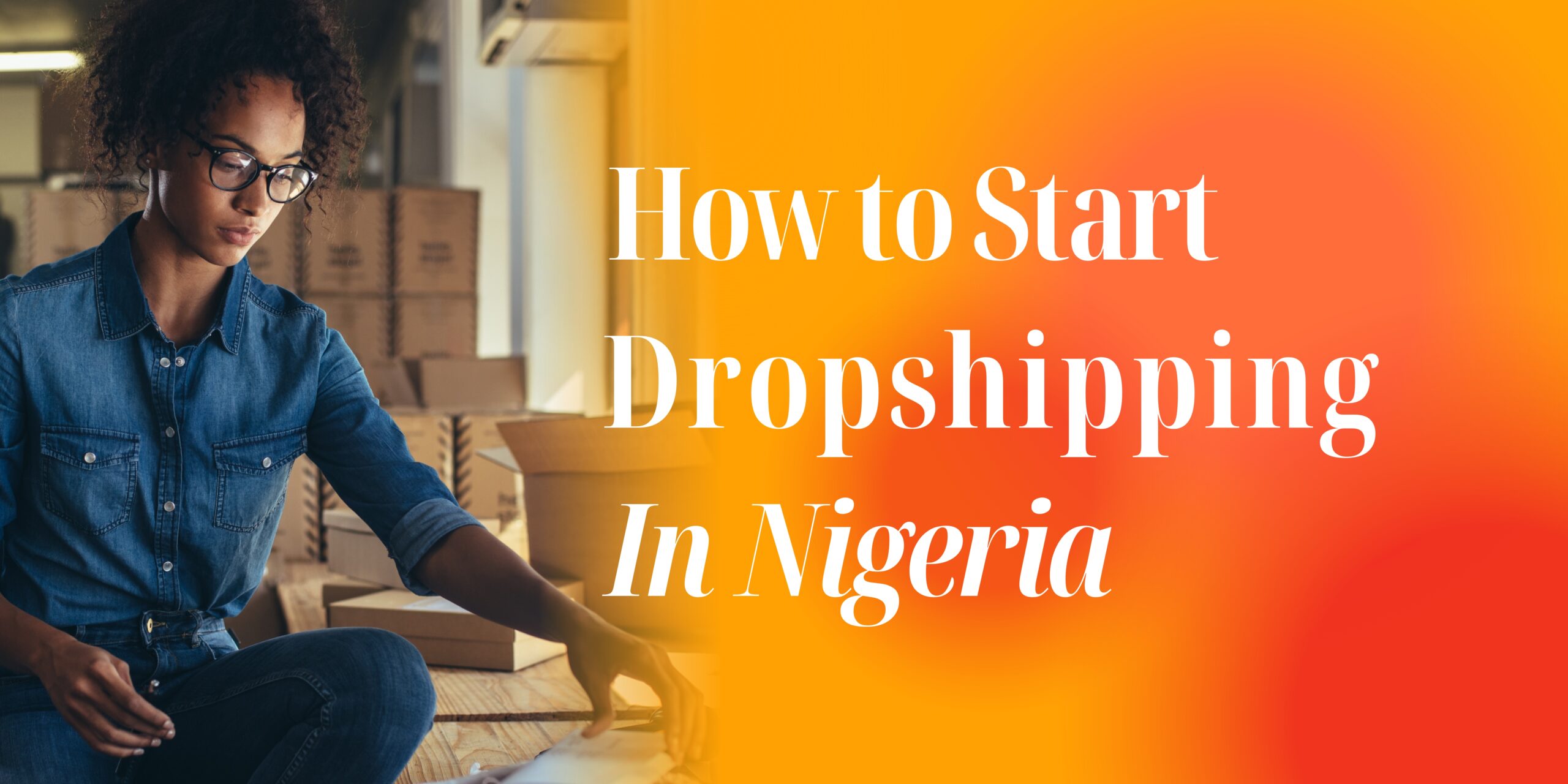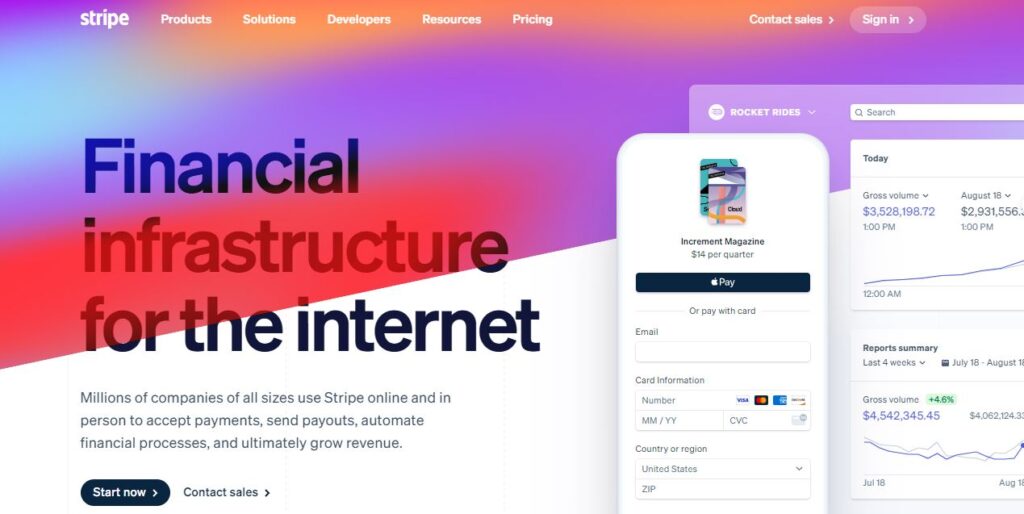How to Start a Dropshipping in Nigeria

Are you having trouble with how to start a dropshipping business in Nigeria? Worry no more; in this article, we shall discuss How to Start a Dropshipping in Nigeria and ways you can gain success.
Dropshipping is not just a global trend; it’s a lucrative opportunity right here in Nigeria. With the growing e-commerce landscape, establishing your dropshipping business can be a game-changer. In this guide, we’ll explore the ins and outs of starting a dropshipping venture in Nigeria, from understanding the basics to scaling for success.
Intro to How to Start a Dropshipping in Nigeria
Welcome to the world of dropshipping! If you’ve been contemplating how to dip your toes into the e-commerce waters in Nigeria, you’re in the right place. Let’s unravel the mysteries of dropshipping and discover why it’s an excellent venture for the Nigerian market.
What is dropshipping?
Dropshipping is a business model that enables you to market and sell products online without the necessity of owning or managing the physical facility where these products are stored and processed. Essentially, it empowers you to establish an e-commerce store and offer a diverse array of products without the responsibility of managing inventory and fulfillment processes.
How Does Dropshipping Work?
The dropshipping business model is a strategic alliance between a customer-facing online store and its suppliers. This innovative approach to e-commerce offers entrepreneurs the flexibility to sell products without the complexities of owning or managing physical inventory. Let’s delve deeper into the workings of dropshipping, exploring both independent supplier searches and a streamlined approach using apps like DSers.
Independent Supplier Search
As an entrepreneur who wants to know how to start a dropshipping business in Nigeria and opt for a hands-on approach in their dropshipping journey, embark on an independent search for wholesale suppliers. This process involves utilizing established supplier databases, such as:
- AliExpress: A globally recognized platform connecting businesses with suppliers, offering a vast array of products.
- SaleHoo: A comprehensive directory providing access to legitimate and verified wholesale suppliers.
- Worldwide Brands: A platform specializing in connecting businesses with certified suppliers, ensuring reliability and quality.
By engaging in this method, entrepreneurs have the autonomy to curate a network of suppliers based on their preferences, market demands, and specific business requirements. This allows for a tailored selection of products that align with the entrepreneur’s vision for their online store.
Streamlined Approach with DSers
For those seeking a more streamlined and automated process, apps like DSers provide a user-friendly solution. Here’s a step-by-step breakdown:
- Utilize DSers App: DSers is a Shopify app that acts as a bridge, connecting your store to a vast network of suppliers. This app streamlines the product import process and facilitates efficient order fulfilment.
- Browse AliExpress Through DSers: DSers seamlessly integrates with AliExpress, one of the world’s largest online marketplaces. Entrepreneurs can browse AliExpress and import products directly to their Shopify store with a simple click, eliminating the need for manual data entry.
- Automate the Dropshipping Process: Once a customer makes a purchase on the Shopify store, DSers automates the order fulfilment process. The entrepreneur, as the store owner, is then tasked with a simplified verification step, ensuring order details are correct.
- Effortless Order Fulfillment: With a click of the order button, DSers takes care of the rest. The product is shipped directly from the AliExpress supplier to the customer, regardless of their location worldwide.
This streamlined approach not only simplifies the dropshipping process but also allows entrepreneurs to focus on the strategic aspects of their business.
The automation provided by DSers enhances efficiency, ensuring that operational intricacies are handled seamlessly.
In essence, whether entrepreneurs choose an independent supplier search or opt for a streamlined approach with apps like DSers, dropshipping empowers them to create and manage a thriving online store without the burdens of inventory management and fulfillment logistics. It’s a modern and adaptable way to enter the world of e-commerce with minimal overhead and maximum flexibility.
Why dropship in Nigeria?
According to statista.com
In 2020, the number of online buyers in Nigeria was about 76.7 million. Nigeria’s total population amounts to 206 million, and internet penetration is at about 46 percent.
Nigeria’s e-commerce sphere is booming, presenting immense opportunities. But with great opportunities come unique challenges. Let’s explore why dropshipping is a promising venture in Nigeria and what you should watch out for.
Researching Your Niche
A prevalent error when embarking on the journey of learning how to start a dropshipping business in Nigeria is overlooking the consideration of the specific product or service you wish to promote.
Selecting the appropriate niche serves as the guiding compass for your dropshipping venture. In this exploration, we will delve into the pivotal significance of niche selection and delve into popular niches that align with the preferences of the Nigerian market.
Legal Considerations for a Sustainable Dropshipping Business
Starting and maintaining a successful dropshipping business in Nigeria requires a thorough understanding of the legal landscape. Ensuring compliance with various regulations, registrations, and tax considerations is vital for the longevity and sustainability of your venture. In this guide, we will walk you through the essential legal aspects to consider.
Registrations
- Business Registration: Commence your dropshipping journey by registering your business with the appropriate authorities. This not only establishes your legitimacy but also provides a legal framework for your operations.
- Tax Identification Number (TIN): Obtain a Tax Identification Number to fulfill your tax obligations. This unique identifier is crucial for legal transactions and financial activities related to your dropshipping business.
- Import and Export Licenses: If your dropshipping business involves international transactions, familiarize yourself with import and export regulations. Ensure that you have the necessary licenses to facilitate smooth cross-border operations.
Tax Considerations
- VAT Registration: In Nigeria, Value Added Tax (VAT) applies to certain goods and services. Determine whether your products fall under the VAT category and register accordingly to fulfill your tax responsibilities.
- Corporate Income Tax: Understand the corporate income tax rates applicable to your business structure. Compliance with corporate tax regulations is essential for maintaining legal standing and financial stability.
- Customs Duties and Tariffs: If your dropshipping involves importing goods, be aware of customs duties and tariffs. Complying with these regulations ensures seamless customs clearance and avoids legal complications.
Legal Documentation
- Terms and Conditions: Draft comprehensive terms and conditions for your dropshipping business. Clearly outline the rights and responsibilities of both you and your customers to mitigate potential legal disputes.
- Privacy Policy: Create a privacy policy that adheres to data protection laws. Safeguarding customer information is not only ethical but also a legal requirement in many jurisdictions.
- Return and Refund Policy: Clearly communicate your return and refund policies to customers. Transparent and fair policies contribute to customer trust and help you navigate legal aspects related to returns.
Compliance with Consumer Protection Laws
- Consumer Rights: Familiarize yourself with consumer protection laws to ensure your business practices align with these regulations. Upholding consumer rights is not just ethical but also legally mandated.
- Advertising Standards: Adhere to ethical advertising standards. Misleading or false advertising can lead to legal repercussions. Provide accurate information about your products and services.
Conclusion
By proactively addressing legal considerations, you lay a solid foundation for the success and sustainability of your dropshipping business. Stay informed, seek professional advice when needed, and ensure compliance with relevant laws and regulations. This not only protects your business but also builds trust with customers and partners.
In summary, legal considerations for a dropshipping business in Nigeria involve:
- Business registration and obtaining a TIN
- Understanding and complying with import/export regulations
- VAT registration and corporate income tax compliance
- Awareness of customs duties and tariffs
- Crafting comprehensive legal documentation (terms and conditions, privacy policy, return and refund policy)
- Compliance with consumer protection laws and advertising standards.
Setting Up Your Online Store: A Dropshipping Tutorial
Congratulations on choosing your niche! Now, let’s turn your vision into reality by setting up your online store for dropshipping in Nigeria. In this comprehensive guide, we’ll guide you through the process of selecting the right platform, customizing your store, and establishing a strong brand presence.
Choosing the Right Platform

1. Shopify:
- Why: Known for user-friendliness and a plethora of apps for dropshipping.
- How: Sign up, choose a plan, and customize your store using Shopify’s intuitive interface.
- Tip: Explore Shopify’s extensive app store for dropshipping-specific plugins.
2. WooCommerce (WordPress):
- Why: It offers flexibility with WordPress integration.
- How: Install the WooCommerce plugin on your WordPress site, customize it, and start selling.
- Tip: Leverage WordPress themes to enhance the visual appeal of your store.
Learn from this website to gain inspiration from Jupeganshop.com
3. AliExpress Affiliate:

- Why: It directly integrates with AliExpress, a popular dropshipping source.
- How: Join the AliExpress Affiliate Program, generate affiliate links, and embed them in your store.
- Tip: Curate products from AliExpress with high ratings and positive reviews.
4. Alibaba Affiliate:
- Why: Connect with a vast array of suppliers on Alibaba.
- How: Enroll in the Alibaba Affiliate Program, obtain affiliate links, and incorporate them into your store.
- Tip: Prioritize suppliers with a proven track record for reliability.
Customizing Your Store
1. Themes and Branding:
- Why: Establish a unique brand identity.
- How: Choose a visually appealing theme, customize colours, and incorporate your brand logo.
- Tip: Keep your design clean and easy to navigate for a positive user experience.
2. Product Pages:
- Why: Convince potential customers to make a purchase.
- How: Craft compelling product descriptions, use high-quality images, and highlight key features.
- Tip: Incorporate customer reviews to build trust.
3. Payment Gateways:
- Why: Facilitate secure and convenient transactions.
- How: Integrate reliable payment gateways like Flutterwave or PayPal.
- Tip: Offer multiple payment options to cater to diverse customer preferences.
Establishing a Brand Presence
1. Social Media Integration:
- Why: Expand your reach and engage with your audience.
- How: Link your store to social media accounts, share product updates, and interact with followers.
- Tip: Utilize Instagram and Facebook for visual content and promotions.
2. Content Marketing:
- Why: Build authority and attract organic traffic.
- How: Start a blog within your store, providing valuable content related to your niche.
- Tip: Incorporate SEO best practices for improved visibility.
3. Customer Support:
- Why: Enhance customer satisfaction and loyalty.
- How: Implement a responsive customer support system and address queries promptly.
- Tip: Consider using chatbots to handle common queries efficiently.
In summary
By following these steps, you’re well on your way to creating a successful dropshipping store in Nigeria. Remember to continually optimize and adapt your store based on customer feedback and market trends. With a solid foundation and ongoing dedication, your online store can thrive in the competitive world of e-commerce.
Learn more: How to make money online
Finding Reliable Suppliers: A Crucial Step in Dropshipping Success
The reliability of your suppliers is paramount to the success and sustainability of your business. This guide will walk you through essential criteria for selecting trustworthy partners and offer insights on avoiding scams that could potentially jeopardize your venture.
Criteria for Selecting Trustworthy Suppliers
Reputation and Reviews:
- Why: Past performance is a strong indicator of future reliability.
- How: Research suppliers thoroughly, check reviews, and seek testimonials from other businesses.
- Tip: Prioritize suppliers with a positive track record and satisfied customers.
Navigating the Dropshipping Supplier Maze
Finding a reliable dropshipping supplier is a pivotal step in ensuring the success and longevity of your business. The abundance of suppliers adds complexity to the selection process, making it essential to avoid potential pitfalls that could lead to delays, customer complaints, and profit loss. This guide is designed to help you navigate the intricate process of shortlisting and selecting a trustworthy supplier for your dropshipping venture.
Finding Dropshipping Suppliers
1. Basic Internet Search:
- Challenge: Suppliers may not have a strong online presence.
- Solution: Conduct extensive searches and be prepared for poorly maintained websites.
Supplier Directories:
- Challenge: Search engine results can be overwhelming.
- Solution: Utilize paid third-party directories offering filtered options, streamlining your search parameters.
Contact manufacturers directly:
- Challenge: Manufacturers may be unresponsive.
- Solution: Identify the product’s manufacturer and inquire about their wholesale distributors.
Attend trade shows or conferences:
- Advantage: Ideal for discovering suppliers and staying updated on industry trends.
- Tip: Interact with major suppliers and gain insights into the latest technologies.
Avoiding Scams in the Dropshipping Market
Thorough background checks:
- Red Flag: Recurring monthly fees for doing business.
- Tip: Trustworthy suppliers do not charge fees for business transactions.
Secure payment methods:
- Red flag: suppliers insisting on a single payment method.
- Tip: Use traceable payment methods to protect your financial interests.
Legal Documentation:
- Red Flag: readily agreeing to do business without verification.
- Tip: Legitimate wholesalers require proof of business and authorization.
Scam Warning Signs:
- Red flags: unprofessional communication, inconsistent information, unusually low prices.
- Tip: Trust your instincts; if it seems too good to be true, it probably is.
Choosing a Dropshipping Supplier
1. High Product Quality:
- Focus: Prioritize suppliers with a proven record of high-quality products.
- Tip: Long-term benefits outweigh potential higher costs.
2. Agreeable Per-Order Fee:
- Consideration: Negotiate a fair per-order fee that ensures profitability.
- Tip: Avoid suppliers with exorbitantly high fees.
3. Good Shipping Speed:
- Essential: Timely delivery is critical for customer satisfaction.
- Tip: Choose a supplier capable of quick deliveries to stay competitive.
4. Experienced Staff and Sales Representatives:
- Efficiency: Effective communication with experienced staff is vital.
- Tip: Supplier representatives knowledgeable about their products enhance efficiency.
5. Return Policies:
- Consideration: Ensure the supplier’s return policies align with your business model.
- Tip: Having control over the return process can be beneficial for quality checks.
Choosing Wisely
Choosing a dropshipping supplier is a pivotal decision that can influence the success or failure of your business. Thoroughly research potential suppliers, considering product quality, pricing, shipping, return policies, industry experience, and reviews. How to start a dropshipping in Nigeria. A reliable supplier contributes to your business’s reputation for speed, quality, and efficiency, while a subpar one can harm both your budget and reputation. Take your time, gather information, and make a carefully considered choice, as the success of your dropshipping business is intrinsically tied to your supplier.
Here’s to finding the right supplier for your dropshipping success!
Payment Gateways for Nigerian Dropshippers
How to start a dropshipping in Nigeria you should consider having a payment gateway that can accept all transactions across the globe.
Smooth transactions are the lifeblood of e-commerce. We’ll explore local and international payment gateways, ensuring your customers have a seamless and secure shopping experience.
Payment platforms to consider

Unlocking Stripe for Nigerian Businesses: A Comprehensive Guide
If you’re navigating the landscape of online payment processing for your Nigerian business, this guide is your compass. We’re here to address the common queries surrounding the use of Stripe in Nigeria, shedding light on nuances, restrictions, and viable alternatives.
For a quick glimpse into the world of online transactions, if you want to know more about how to start a dropshipping in Nigeria?
Choosing payment system
Consider checking out our article on the simplicity of opening a Delaware business bank account online. However, if you’re prepared for a detailed journey into accepting payments from Nigeria via Stripe, read on.
- Does Stripe Accept Payments From Nigeria?
- Yes, Stripe does accept payments from Nigeria.
- Note: While Nigerian companies can’t open Stripe payment processing accounts, Stripe allows the acceptance of payments from Nigerian customers.
- Stripe Payments vs. Country of Incorporation
- Focus: Accepting payments from Nigerian customers.
- Important Distinction: This guide does not cover Stripe’s support for companies incorporated in Nigeria.
- How You Can Use Stripe From Africa
- Many African entrepreneurs register their companies in foreign countries, like the United States, for benefits such as access to US banking and financial services.
- Foreign non-resident entrepreneurs can open a US bank account remotely and access US payment processing, including Stripe.
- Alternatives to Using Stripe
- Explore other payment processing options like 2Checkout, PayPal, Amplify, and PayStack.
- Caution: Compare fees, as some alternatives may charge higher commissions than Stripe.
- Frequently Asked Questions
- Can Stripe Accept Payments From Anywhere?
- Yes, Stripe can accept payments from most countries, excluding blacklisted or conflict-ridden nations.
- Which Payment Gateway Is Best in Nigeria?
- Depends on the company’s registration location; choose a payment gateway and a bank account in the same country.
- Does Stripe Operate in Africa?
- Stripe doesn’t operate directly in Africa, but entrepreneurs register in the US for access to a US bank account and Stripe.
- Can Stripe Accept Payments From Anywhere?
Ready to Explore Your Options
Armed with this comprehensive guide, you’re equipped to navigate the complexities of unlocking Stripe for your Nigerian business. Whether opting for Stripe or considering alternative solutions, make informed decisions to streamline your payment processing journey.
Optimizing Product Listings for SEO
SEO is an essential method for generating organic traffic to your website. Visibility is key. We’ll guide you through the art of optimizing your product listings for the Nigerian market, including effective keyword research and creating compelling product descriptions.
To learn more visit: How to Start a Dropshipping in Nigeria Optimise Your Website Through SEO
Marketing Your Dropshipping Business
Create a High-Converting Dropshipping Website
Before allocating your entire budget to marketing your dropshipping store, ensure that your website not only attracts visitors but also compels them to stay and make a purchase.
Begin by selecting a distinctive and brand-relevant website name that sets your dropshipping store apart from others in the eCommerce realm. Prepare a clear message on your homepage that succinctly communicates the essence of your dropshipping products and identifies your target audience.
Emphasize specialization in your product offerings to facilitate easy comprehension and word-of-mouth marketing. Opt for a focused niche rather than a broad spectrum.
Invest in professional product photography, recognizing that the initial expense is a worthwhile investment. A single compelling photo can drive numerous product sales, setting your store apart from competitors relying on generic, low-quality visuals.
After deciding on your product line, establish trust quickly. Incorporate product reviews, testimonials, and links to Trustpilot to bolster credibility. Make it easy for potential customers to reach out by providing quick contact options, such as live chat or Facebook Messenger, on each product page.
Keep in mind that the average conversion rate hovers around 1–2%, highlighting the need for a consistent flow of thousands of visitors to generate meaningful revenue. To achieve this, delve into the best practices for advertising dropshipping through SEO. This comprehensive approach will optimize your website for search engines, attracting a steady stream of potential customers.
2. Do Your SEO Content Marketer Hat
While enhancing your SEO descriptions may not offer the quickest route to attracting potential customers and promoting your dropshipping store, consistent effort in this area proves to be a wise long-term investment. It is likely to constitute the most substantial and cost-effective share of your incoming leads.
To embark on the SEO journey, initiate the process by sharing relevant information on your blog that resonates with your target audience. Stick to a consistent posting schedule, whether it’s twice a week or bi-monthly.
For search engines like Google, Bing, and Yahoo! to rank your dropshipping business, strategically incorporate specific, long-tail keywords throughout your website updates and every published article. Rather than opting for generic terms like “best pillowcases,” embrace more specific, long-tail alternatives like “silk pillowcases for better hair and skin.” Contrary to intuition, less popular long-tail keywords can attract more traffic, as individuals searching for specific items are more likely to convert.
Writing a well-thought-out keyword strategy is crucial, and you can leverage various tools such as Moz, SEMrush, Google Keyword Planner, and Google Trends for this purpose. If you’re inclined to go the extra mile, delve into enhancing your HTML with schema to facilitate search engines incorporating your shopping results, thereby simplifying traffic acquisition.
3. Embrace the Power of Email Marketing
After putting in the effort to attract potential customers to your website, it’s crucial not to lose touch with them once they navigate away.
to master how to start a dropshipping in Nigeria, a newsletter is a smart strategy for eCommerce stores to guide visitors into their purchasing funnel. The most effective newsletters go beyond providing a welcoming discount for the first order; they also incorporate SEO-driven content along with suggestions for relevant products. This approach ensures a higher conversion rate and establishes a means of ongoing communication with customers.
For instance, consider segmenting your email campaigns based on the categories of items your customers have purchased. Send targeted promotions to individuals who bought newborn clothes, featuring deals on clothing for six-month-olds. Similarly, if a customer has purchased women’s swimsuits, seize the opportunity to email them promotions for stunning winter dresses as autumn approaches. This personalized approach enhances customer engagement and maximizes the impact of your email marketing efforts.
Handling Customer Service

How to start dropshipping in Nigeria requires trust-building
Building trust is paramount. how to start a dropshipping in Nigeria. We’ll discuss strategies for excellent customer service, from building credibility to navigating returns and refunds with grace.
Scaling Your Dropshipping Business
Establish Your BrandAre you ready to take it to the next level?
As a dropshipper, your role involves selling products from manufacturers, but the inherent risk lies in competitors offering the same products at lower prices. How to start a dropshiping in Nigeria. safeguard against the race to the bottom, it is crucial to build a brand for your business, which should serve as the cornerstone for all your endeavours.
A brand accomplishes the following:
- Instantly communicate your identity and values to shoppers.
- Sets you apart from other dropshippers.
- Persuade shoppers to choose your business over competitors.
If increasing revenue is challenging due to heightened competition,this guide on how to start a dropshipping in Nigeria the solution lies in branding. Even while operating as a dropshipper, this step entails viewing your operation not merely as a dropshipper but as a genuine eCommerce brand, even if you continue to sell products from other sources.
This is significant because consumers place trust in high-quality, consistent brands—consistent branding can result in a substantial 33% increase in revenue. Given that consumers can’t physically inspect your business and products, they often rely on your branding to inform their purchasing decisions.
Therefore, if you haven’t established a brand yet, it’s imperative to create one promptly.
Gain Insight into Your Customer’s Mind
In the quest to expand your dropshipping business, customers serve as the vital life force of your enterprise. How to start dropshipping in Nigeria and Scaling your dropshipping operation requires a more profound understanding of your audience than a superficial awareness. Merely knowing that your target audience includes 30-year-old soccer moms is insufficient when aiming for a six-figure business.
This involves delving into:
- Shopper Behavior: Gain insights into how people navigate your website by utilizing web analytics tools like Google Analytics and HubSpot. Enhance your understanding by incorporating a heatmap tool such as Hotjar to observe the decision-making process of shoppers in action.
- Your Sales Funnel: Understand how customers discover your business and the number of interactions required before a purchase.
- Pain Points: Identify the challenges that keep your customers awake at night. Determine the pressing issues they need to resolve and examine how well your solution aligns with their needs.
- Customer Costs: Evaluate the expenses incurred in targeting a customer before they make a purchase and assess whether you are recovering your costs.
The objective is to pinpoint areas of friction in the customer experience. Move beyond demographic insights and strive to comprehend the underlying reasons why customers choose to buy from your business. This deeper understanding can pave the way for numerous enhancements across your website, customer portal, product pages, and more. However, it is crucial to analyze the data attentively to formulate a strategic path forward.
5 Common Pitfalls to Avoid
Forewarned is forearmed. We’ll highlight common pitfalls in Nigerian dropshipping and provide insights on overcoming logistical challenges and staying ahead of market trends.
- Overlooking Supplier Reliability: A common pitfall is not thoroughly vetting and establishing reliable relationships with suppliers. Relying on untrustworthy suppliers can lead to issues such as delayed shipments, poor product quality, or even stockouts. Regularly assess your suppliers, their track record, and their ability to meet demand consistently.
- Ignoring Product Quality Control: Focusing solely on profit margins and neglecting product quality is a grave mistake. Customers expect value for their money, and delivering subpar products can lead to negative reviews, chargebacks, and damage to your brand reputation. Regularly inspect the quality of products offered by your suppliers to ensure customer satisfaction.
- Neglecting Customer Service: Providing excellent customer service is crucial in any business, and dropshipping is no exception. Ignoring customer inquiries, failing to address issues promptly, or lacking transparency in communication can result in dissatisfied customers and a tarnished brand image. Prioritize responsive and transparent customer service to build trust with your audience.
- Insufficient Marketing Strategy: Relying solely on the dropshipping model without a robust marketing strategy is a common pitfall. It’s essential to actively promote your products, differentiate your brand, and reach your target audience effectively. Neglecting marketing efforts can result in poor visibility and slow business growth.
- Lack of Diversification: Relying on a single product or a narrow niche without diversification can make your business vulnerable. Trends change, and relying too heavily on a single product line may expose you to market fluctuations. Diversify your product range to adapt to changing consumer preferences and market dynamics.
Nigerian Dropshipping Success Stories
1. Aisha’s Unique Fashion Hub
“I ventured into dropshipping with a passion for fashion. Through careful product selection and strategic marketing, my online store has become a go-to destination for trendy Nigerian fashion. It’s not just a business; it’s my creative outlet. Dropshipping opened doors I never imagined!”
2. Ngozi’s Wellness Corner
“Health and wellness have always been my focus. Dropshipping enabled me to offer a curated selection of wellness products to the Nigerian market. It’s incredibly rewarding to contribute to the well-being of my customers while running a successful business.”
Conclusion
As we wrap up our guide, take a moment to reflect on the key steps we’ve covered. How to start dropshipping in Nigeria is an exciting venture with vast potential. Remember, persistence and adaptability are your greatest allies.
Frequently Asked Questions
- Is drop-shipping legal in Nigeria?
- Absolutely! However, ensure you comply with all legal requirements, including registration and tax considerations.
- How do I choose the right niche for my dropshipping in Nigeria?
- Consider your interests, market demand, and competition. Finding a balance between passion and profitability is key.
- What payment gateways are popular in Nigeria for dropshipping?
- Local options like Flutterwave and international ones like PayPal are popular among Nigerian dropshippers.
- How can I handle returns and refunds effectively?
- Transparency and clear policies are crucial. Communicate openly with customers and have a streamlined process in place.
- Is dropshipping only for experienced entrepreneurs?
- Not at all! With the right research and dedication, even beginners can succeed in the world of dropshipping.



